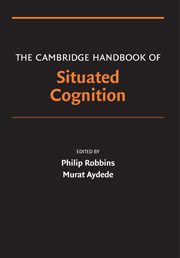Book contents
- The Cambridge Handbook of Situated Cognition
- The Cambridge Handbook of Situated Cognition
- Copyright page
- Contents
- Acknowledgments
- Contributors
- Part I Backdrop
- Chapter 1 A Short Primer on Situated Cognition
- Chapter 2 Scientific Antecedents of Situated Cognition
- Chapter 3 Philosophical Antecedents of Situated Cognition
- Part II Conceptual Foundations
- Part III Empirical Developments
- Index
Chapter 2 - Scientific Antecedents of Situated Cognition
from Part I - Backdrop
Published online by Cambridge University Press: 05 June 2012
- The Cambridge Handbook of Situated Cognition
- The Cambridge Handbook of Situated Cognition
- Copyright page
- Contents
- Acknowledgments
- Contributors
- Part I Backdrop
- Chapter 1 A Short Primer on Situated Cognition
- Chapter 2 Scientific Antecedents of Situated Cognition
- Chapter 3 Philosophical Antecedents of Situated Cognition
- Part II Conceptual Foundations
- Part III Empirical Developments
- Index
Summary
- Type
- Chapter
- Information
- The Cambridge Handbook of Situated Cognition , pp. 11 - 34Publisher: Cambridge University PressPrint publication year: 2008
- 23
- Cited by



